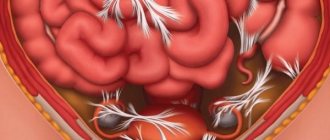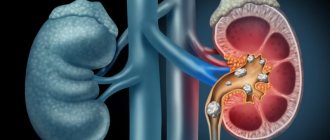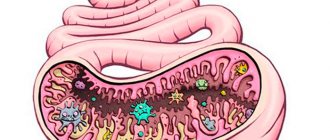Nausea is a feeling of discomfort in the upper chest and neck that precedes vomiting. This condition usually occurs during the day and after eating food. It rarely appears closer to night, so do not neglect this unpleasant symptom. If you regularly feel sick in the evenings, this indicates a disease, the treatment of which will require visiting specialists.
Why do you feel sick in the evening?
There are an incredible number of reasons why a person constantly feels sick in the evening. These are diseases of the central nervous system and digestive system, colds, and in women – pregnancy. Often the discomfort goes away on its own. If this does not happen, you need to consult a doctor and undergo an examination to determine the causes of discomfort and select effective treatment.
Disease of the digestive system
Nausea in the evening with possible subsequent vomiting signals diseases of the digestive system. This could be gastritis, ulcers, pancreatitis, intestinal obstruction, appendicitis.
Ulcer, gastritis, gastroenteritis
In these diseases, nausea is accompanied by vomiting, heaviness in the stomach, cramps, and a feeling of bloating. As a rule, this occurs after eating sour, fatty, spicy or salty foods, as well as during exacerbation of the disease.
Gallbladder disease
In addition to nausea that occurs while eating, this disease is indicated by bloating, heartburn, pain in the right hypochondrium, and the taste of iron in the mouth.
Intestinal infections
The following symptoms may indicate this disease:
- nausea after a certain period of time after eating;
- pain in the navel area;
- weakness;
- dizziness;
- temperature rise to 37 °C.
If diarrhea or vomiting occurs, you should urgently call an ambulance. In the best case, it will end with gastric lavage, in the worst - treatment in the infectious diseases department of the hospital.
Pancreatitis
Disorders of the pancreas are characterized by nausea after eating and bloating. There may be a bitter taste in the mouth and pain in the right hypochondrium.
Kidney diseases
Pain in the lumbar region, difficulty urinating, a person vomits before going to bed - all this signals kidney disease.
Appendicitis
In addition to nausea in the evening, an attack of appendicitis is accompanied by vomiting, fever, pain in the upper abdomen, gradually shifting to the right side. At the slightest suspicion of this process, you should immediately consult a doctor.
Central nervous system disease
Night sickness can be caused by diseases of the nervous system. These are meningitis, migraines, traumatic brain injuries - bruises, swelling, concussions. Usually, severe headaches are added to nausea before bedtime. It is dangerous to hope that the malaise will go away on its own; you should definitely contact a neurologist.
Nausea with colds and flu
If you begin to feel sick in the evening, the cause may be a cold and subsequent intoxication. Headaches are tormented, the condition becomes weakened. To get rid of discomfort, you need to eliminate the effects of toxin poisoning and ensure you drink plenty of fluids.
Nausea in the evening - causes and how to get rid of it
It is extremely unpleasant when you feel sick in the evenings. Unfortunately, everyone knows this feeling.
In healthy people, it occurs very rarely, only with eating disorders, if you have consumed low-quality or expired products.
But if you feel sick before bed with alarming regularity, then this is a good reason to visit a doctor, since leaving such an alarming symptom unattended is simply dangerous.
Reasons of a physiological nature
It is unfortunate that nausea that lasts for a long time almost never brings the desired relief. Here it can be compared to a sudden attack that ends in vomiting.
On the contrary, nausea in the evening is debilitating, prevents normal sleep and significantly reduces the quality of sleep.
This is especially unpleasant if other symptoms are added to this process, for example, weakness, stomach pain or dizziness, or even all at once.
Most often, the feeling of being sick is not accompanied by illness. Nausea can be caused by poor diet or lifestyle, that is, external factors that can be easily detected and corrected.
Polluted and gassed city air can provoke attacks in the evening, since all the dirt that rises into the air during the day falls down, having a negative impact on people with poor health.
And if you have irritating substances in your bedroom such as perfumes, tobacco smoke, household chemicals, etc., then nausea in the evening simply cannot be avoided.
The most common cause of nausea in the evenings is living under severe stress and overwork.
These factors provoke an increase in pressure, which, in turn, leads to nausea, weakness, loss of orientation, cold sweat, dizziness, sparks and darkness in the eyes.
Hypertensive people are more likely than others to feel evening nausea, so if you have a tendency to increase blood pressure, it is better to have a blood pressure monitor and medications in the house to bring you to your senses.
Nausea at night can be triggered by noticeable overeating the day before, especially if you allowed yourself to consume a large amount of fried and fatty foods.
The digestive system simply turns out to be unprepared to go into emergency mode at a time when it is supposed to rest, so your body simply strives to get rid of the excess, provoking vomiting.
This is a normal protective reaction of the body to overeating.
Often people experience nausea after heavy alcoholic libations, which is natural, since alcoholic drinks are a real poison for your body. The liver neutralizes a small amount of alcohol using its own enzymes, but such work is very difficult for it.
If you’ve obviously had too much alcoholic drinks, then the body again turns on a defensive reaction: you feel sick at night if you’ve consumed too much alcohol in the evening.
Nausea caused by physiological reasons occurs quite rarely and is neutralized as soon as you eliminate the immediate cause of your cloudiness. It is the ability to eliminate nausea at night by stopping the causes of its manifestation that allows us to say that there are no pathologies in your body.
Causes of a pathological nature
There is a whole list of very serious diseases, among the symptoms of which is nausea during sleep, as well as after it. And all these problems require the participation of a competent doctor:
- Autoimmune diseases including HIV and AIDS. The patient’s immunity is severely suppressed, and accordingly, the body can hardly fight infections. Even the entry of a pathogenic microorganism that is harmless to a healthy person into an organism suffering from an autoimmune disease can cause poisoning, resulting in vomiting.
- Diseases of the liver and biliary tract. We are talking about cholecystitis, dyskinesia, cirrhosis and other diseases. The patient may feel sick both during the day and at night, but it is in the evening that the problem will be more noticeable, especially on a full stomach.
- Intestinal infections, colic, dysbacteriosis. All this interferes with adequate digestion, leading to the release of undigested food back into the esophagus, as well as the absorption of harmful products into the blood. As a consequence of this, nausea occurs.
- Oncology. Diseases of this group themselves worsen a person’s well-being, provoke a decrease in immunity and intoxication of the entire body. The fact is that immune cells intensively fight cancer cells and die en masse, while the body remains poisoned. Chemotherapy and radiation treatments can also have a huge impact on a person’s condition.
- Brain injuries and diseases. Even if you have a concussion, you will feel nauseous. More serious problems provoke nausea after sleep, as well as before it.
- Diseases of the digestive system, including the stomach. In this case, the patient will feel pain in the abdomen. This is especially noticeable if the patient goes to bed empty or violates the diet prescribed by the doctor for recovery.
- Diseases of the endocrine system. The hormones that our endocrine system secretes are involved in many key processes occurring in our body. If there is an imbalance in the quantity and ratio of certain hormones, this will also affect your well-being. For example, panic attacks may begin, sudden weight gain or loss may occur, the patient may experience dizziness, nausea and other unpleasant symptoms.
- Attack of appendicitis. When the appendix is inflamed, the patient feels sharp pain in the abdomen, feels nauseous, sometimes to the point of vomiting. Chronic appendicitis is characterized by nausea at night and a feeling of constant heaviness in the right side.
- Use of a number of medications. Some drugs cause nausea; manufacturers always write about this side effect in the instructions. We are talking about sleeping pills, sedatives and other drugs.
There are a number of factors that provoke nausea only in women, which is understandable. This is pregnancy, menstruation, manifestations of menopause. In the early stages of pregnancy, toxicosis often occurs, which may well explain why you feel sick in the evening. But more often, pregnant women suffer from nausea in the morning, however, all this is very individual.
Before the onset of menstruation, women's hormonal levels change dramatically.
This is what causes the onset of menstruation, as well as many unpleasant symptoms, for example, dizziness, nausea, pain and cramps, pressure surges, fainting, etc.
Modern ladies are so busy with everyday affairs during the day that they don’t pay much attention to their condition, but in the evening, when they relax, all the unfavorable factors become much more noticeable.
Pregnancy
During the first trimester, pregnant women experience nausea due to toxicosis. Most expectant mothers experience it in the morning, but in some cases it occurs throughout the day, including in the evening. Often women complain that they feel sick at night, during sleep, as a result of which they cannot sleep.
During pregnancy, the perception of odors increases, so nausea may be a reaction to them.
In addition, expectant mothers may experience malaise if this is their first pregnancy, toxicosis is inherited, as well as in a number of other cases. There is no need to consult a doctor at this stage; the condition will soon normalize on its own.
The causes of nausea in the evenings in women during pregnancy can be more serious:
- cold;
- inflammation of the genital organs;
- pathologies of the endocrine system;
- stress, overwork.
In these situations, the help of a specialist is necessary.
Measures to combat evening toxicosis
To prevent the feeling of lightheadedness from bothering a woman during pregnancy, she should not fast. Every meal should be complete.
The expectant mother is recommended to drink sour fruit drinks and juices. This will have a positive effect on the health of the unborn child.
You should also eat a lot of fruits during pregnancy. What fruits are recommended for an expectant mother to eat?
- Green apples.
- Grapefruits.
- Currants.
- Lingonberry.
- Kiwi, etc.
In the evening, it is recommended to refuse to eat. Why? If a pregnant girl eats heavily at night, she will definitely face the problem of feeling unwell in the morning.
After waking up, she may feel dizzy and have tinnitus. In this case, toxicosis can lead to vomiting.
During this illness, it is important to prevent dehydration. To prevent dehydration, drink plenty of fluids. A pregnant girl should drink a lot of mineral water.
Maintaining water balance in the body will help prevent dry skin, dry hair and the appearance of a pale skin tone.
Also, the expectant mother should take care of her physical fitness. Moderate physical activity is considered a good prevention of evening nausea.
Nobody says that a pregnant woman should run cross-country. She is recommended to do yoga, swimming or gymnastics for pregnant women.
Nausea is a rather unpleasant ailment, which is a symptom of a chronic or situational illness. In most cases, its appearance is preceded by food poisoning or alcohol intoxication.
If nausea occurs systematically in the morning and evening, a person should pay attention to his health, because the reasons for this phenomenon may lie in a disruption in the normal functioning of his body.
With nausea, unpleasant sensations occur in the upper part of the stomach and in the neck, where the point of gastric projection is located. Why does this phenomenon occur?
The causes of this disease are associated, firstly, with a decrease in the tone of the gastric wall, and secondly, with a slowdown in the process of gastric peristalsis.
Modern medicine diagnoses the causes of nausea, linking them with a number of diseases of the gastrointestinal tract.

Nausea in children at night
There are a number of causes of nausea in the evening in children. This is motion sickness, poisoning, ARVI. If a baby has an infectious disease, he loses his appetite, has a high temperature, vomiting and pain in the abdomen.

During bouts of vomiting, parents do not need to panic; this condition is passed on to the baby. A sleeping child should not be left alone to avoid choking. During attacks, you should tilt him forward, holding his torso and forehead with your hands to help get rid of vomit. Afterwards, you need to rinse your mouth so that the acid does not corrode the tooth enamel, and then give the baby a small amount of water to drink.
Evening toxicosis
This phenomenon can occur in women of different ages. Morning sickness is an absolutely normal phenomenon that any girl experiences during pregnancy.
Usually, expectant mothers feel sick in the early stages, or more precisely in the first trimester of pregnancy.
We recommend reading: Prostamol uno instructions for use, contraindications, side effects, reviews
As for evening sickness, many factors can provoke it. One of the most common factors that trigger feelings of lightheadedness in the evening is stress.
Why does a girl experience nausea due to nervousness in the early stages of pregnancy? The fact is that prolonged psycho-emotional shocks negatively affect the functioning of the gastrointestinal tract.
If a girl worries about something for a long time, she may feel sick even in the evenings.
Treatment
If you feel sick in the morning or in the evening, mint candies, Validol, dry crackers, crackers, and large quantities of liquid will help ease or completely eliminate the discomfort. This could be water, ginger or mint lemonade, or clove tea. Ammonia is effective; a bottle of this liquid should be brought to the nose and inhaled deeply.
Proper breathing can help with nausea. You need to take a deep breath through your nose, then exhale the air evenly. Repeat the procedure several times.
Taking medications to relieve discomfort is recommended only as prescribed by a doctor. Depending on the type of disease, Allochol, Cholenzym, Silimar, Tanacechol, Holosas cope well with nausea.
If a person feels sick, you can overcome the discomfort with folk remedies. These are various decoctions, for example, ginger, rose hips or nettle and milk, and herbal teas (chamomile, sage and rosemary).
How to eat healthy
Constant nausea at night without fever is associated with poor diet. You need to reconsider your daily diet. The main thing is not to transfer it overnight. To prevent food from lying in a lump in the stomach, you need to chew it thoroughly. You should not go to bed immediately after eating.
You need to consume more plant proteins, such as seaweed, buckwheat and oatmeal. Menopausal women should not eat after 6 pm. 2 hours before bedtime, you can eat a banana or drink a glass of kefir. Products made from high-grade flour, sugar, and saturated fats should be avoided.
An oncoming migraine with nausea and headaches can be stopped by eating whole grains, egg yolks, spinach and lean meats. At the same time, you need to eat little by little.
Protection against stress is to relax while eating. It is necessary to include more foods rich in vitamins A, C, E, calcium, magnesium, and selenium. But the consumption of caffeine and alcohol should be reduced.
Nausea at night and in the evening occurs rarely in some people, only with poor diet. The regular occurrence of lightheadedness is associated with a number of serious diseases. This symptom cannot be ignored, but you should urgently seek qualified help.
Nutrition
To get rid of nausea in the evening after eating, you need to establish proper nutrition: give up spicy, smoked, fried foods, as well as delicacies such as chips, fast food, and sausage. You can eat lean fish and meat, soups, corn, rice and millet porridge, potatoes.
A woman’s feeling of nausea occurs due to a lack of glucose in the blood if she is hungry. You just need to eat something and the discomfort will go away.
You should eat often, but in small portions. You should not eat foods that make you feel nauseous, even if they are healthy.
No need to drink while eating. The liquid can be consumed half an hour before meals or an hour after it.
In most cases, nausea is a symptom of some disease. To find out the reason for its appearance, you need to undergo a medical examination.
Types of Nausea
In addition to the reasons described above, there is also a classification of nausea. It is divided into the following types:
- Brain. Occurs due to various brain disorders. These may be diseases of atherosclerosis, hypertension, and malignant formations in the brain. In most cases, this is accompanied by manifestations such as increased intracranial and blood pressure.
- Toxic. This nausea occurs as a result of patient poisoning with various poor-quality food products or as a result of the penetration of endogenous poisons into the body.
- Exchange. In most cases, it is caused by an unbalanced diet, the patient’s use of starvation diets, as well as due to hypovitaminosis and diabetes and other metabolic disorders.
- Vestibular. It is characterized as a consequence of the manifestation of various neuroses. This type of nausea is usually characteristic of pregnant women, as well as during menopause.
- Reflex. Appears due to the development of inflammatory processes in the gastrointestinal tract, as well as as a consequence of active receptor irritation. It is characterized by regular appearance after eating, as well as the patient’s consumption of certain foods.
Digestive system diseases
Nausea is one of the most common symptoms of chronic gastritis or gastroenteritis, ulcerative processes of the intestines and stomach, malsorption syndrome (malabsorption), cholelithiasis and other inflammatory diseases of the abdominal cavity.
Gastritis and gastroenteritis are an inflammatory process that is located, respectively, in the mucous membrane of the stomach and intestines. The causes of this disease may be a certain genetic predisposition, nervous strain, irregular and unbalanced meals. The reason for nausea in the evening is that a person does not follow a diet and there are long breaks between meals. The patient may also experience pain in the upper abdomen, which goes away after eating. However, more often the symptoms of gastritis and gastroenteritis are associated with eating certain foods (excessively sour, salty or spicy). Gastritis often precedes the development of much more serious diseases, such as peptic ulcers of the stomach and duodenum.
Pancreatitis is a potentially very dangerous condition for humans that develops as a result of inflammatory-dystrophic processes in the pancreas. At the beginning of the disease, nausea is observed, which sometimes ends with repeated vomiting. However, the leading symptom of this condition is severe girdle pain in the upper abdomen.
We recommend reading: Paracetamol overdose: symptoms and consequences in children and adults
Biliary dyskinesia is a common pathology, more typical for children, adolescents and young adults. The condition is caused by a change in the normal motility of the gallbladder and, therefore, difficulty in the natural outflow of bile. In addition to nausea, dyskinesia causes belching, bitterness in the mouth and dull pain in the right half of the upper abdomen. In order for a person not to be bothered by nausea in the evenings, it is necessary to adhere to a diet that normalizes the motility of the biliary tract. The diet of such a patient should contain a large amount of proteins and carbohydrates, and fats in limited quantities. It is advisable to replace fried foods with boiled or baked ones.
Foodborne illness is an acute infectious pathology caused by eating poor quality food, contaminated water, contact with a sick person, or simply dirty hands. In mild cases, a person is bothered by painful nausea without other symptoms (fever, weakness, abdominal pain, loose stools mixed with blood and mucus). In this case, it is enough not to eat, drink still water in small sips - perhaps the nausea will go away on its own. If this does not happen, but on the contrary, other signs of an infectious process appear, urgent hospitalization is necessary.

The so-called “acute abdomen” is a complex of inflammatory diseases of the abdominal organs, namely acute appendicitis, cholecystitis, intussusception and others. Nausea at bedtime may be a precursor to these serious surgical situations and requires monitoring over time.
Nutrition correction
If you are vomiting, be sure to drink plenty of fluids in the form of still mineral water, juices, broth, and tea.
The following foods should be excluded from the diet:
Sausages, fast food, chips, and other “harmful goodies.” Milk and fatty dairy products. Canned fish products. Fat meat. Products with a specific taste and smell.
For nausea, it is recommended to take:
Lean fish and chicken meat. Crackers, croutons. Jelly and soups based on clear broths. Porridge: barley, corn, semolina, millet. Vermicelli, rice, potatoes. Bananas, ginger, lemon.
You can learn more about this symptom and its causes by watching this video.
What to do
In the first trimester, women may feel mildly unwell; no treatment is required. The condition will improve if:
- Eat food often, in small portions.
- Include ginger in your diet.
- Drink often, in small portions, avoiding dehydration (two liters per day).
- Massage your wrist.
- Rest. Fatigue during pregnancy manifests itself as nausea.
- Take herbal-based medications (after medical consultation!).
This condition in the early stages should not be underestimated: against the background of toxicosis, inflammatory processes occur. See your doctor immediately if:
- The urine is dark, the pregnant woman has not urinated for more than eight hours.
- Stomach pain.
- Heat.
- Painful urination.
- Headache.
- Yellow skin.










